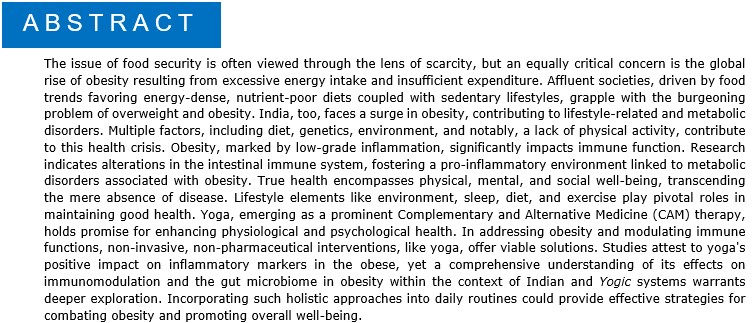A comprehensive review of Yoga's impact on Immunomodulatory Functions and Microbiome in Obesity
DOI:
https://doi.org/10.21760/jaims.8.11.12Keywords:
Health, Immunomodulatory Function, Microbiome, Obesity, Yoga TherapyAbstract
The issue of food security is often viewed through the lens of scarcity, but an equally critical concern is the global rise of obesity resulting from excessive energy intake and insufficient expenditure. Affluent societies, driven by food trends favoring energy-dense, nutrient-poor diets coupled with sedentary lifestyles, grapple with the burgeoning problem of overweight and obesity. India, too, faces a surge in obesity, contributing to lifestyle-related and metabolic disorders. Multiple factors, including diet, genetics, environment, and notably, a lack of physical activity, contribute to this health crisis. Obesity, marked by low-grade inflammation, significantly impacts immune function. Research indicates alterations in the intestinal immune system, fostering a pro-inflammatory environment linked to metabolic disorders associated with obesity. True health encompasses physical, mental, and social well-being, transcending the mere absence of disease. Lifestyle elements like environment, sleep, diet, and exercise play pivotal roles in maintaining good health. Yoga, emerging as a prominent Complementary and Alternative Medicine (CAM) therapy, holds promise for enhancing physiological and psychological health. In addressing obesity and modulating immune functions, non-invasive, non-pharmaceutical interventions, like yoga, offer viable solutions. Studies attest to yoga's positive impact on inflammatory markers in the obese, yet a comprehensive understanding of its effects on immunomodulation and the gut microbiome in obesity within the context of Indian and Yogic systems warrants deeper exploration. Incorporating such holistic approaches into daily routines could provide effective strategies for combating obesity and promoting overall well-being.
Downloads
References
Venkatrao M, Nagarathna R, Majumdar V, Patil SS, Rathi S, Nagendra H. Prevalence of Obesity in India and Its Neurological Implications: A Multifactor Analysis of a Nationwide Cross-Sectional Study. Ann Neurosci 2020;27:153. https://doi.org/10.1177/0972753120987465.
Panuganti KK, Nguyen M, Kshirsagar RK, Doerr C. Obesity (Nursing). StatPearls 2021.
Tiwari A, Balasundaram P. Public Health Considerations Regarding Obesity. StatPearls 2023.
Thaker V V. GENETIC AND EPIGENETIC CAUSES OF OBESITY. Adolesc Med State Art Rev 2017;28:379. https://doi.org/10.1542/9781581109405-genetic.
Geng J, Ni Q, Sun W, Li L, Feng X. The links between gut microbiota and obesity and obesity related diseases. Biomedicine & Pharmacotherapy 2022;147:112678. https://doi.org/10.1016/J.BIOPHA.2022.112678.
Hasan N, Yang H. Factors affecting the composition of the gut microbiota, and its modulation. PeerJ 2019;7. https://doi.org/10.7717/PEERJ.7502.
Estevao C. The role of yoga in inflammatory markers. Brain Behav Immun Health 2022;20:100421. https://doi.org/10.1016/J.BBIH.2022.100421.
Making I of M (US) C on an EF for OPD, Kumanyika SK, Parker L, Sim LJ. Obesity Prevention Strategies in Concept and Practice 2010.
Niemiro GM, Rewane A, Algotar AM. Exercise and Fitness Effect On Obesity. StatPearls 2023.
Cox CE. Role of Physical Activity for Weight Loss and Weight Maintenance. Diabetes Spectr 2017;30:157. https://doi.org/10.2337/DS17-0013.
Montenegro J, Armet AM, Willing BP, Deehan EC, Fassini PG, Mota JF, et al. Exploring the Influence of Gut Microbiome on Energy Metabolism in Humans. Advances in Nutrition 2023;14:840–57. https://doi.org/10.1016/J.ADVNUT.2023.03.015.
Schirmer M, Smeekens SP, Vlamakis H, Jaeger M, Oosting M, Franzosa EA, et al. Linking the Human Gut Microbiome to Inflammatory Cytokine Production Capacity. Cell 2016;167:1125. https://doi.org/10.1016/J.CELL.2016.10.020.
Bentham J, Di Cesare M, Bilano V, Bixby H, Zhou B, Stevens GA, et al. Worldwide trends in body-mass index, underweight, overweight, and obesity from 1975 to 2016: a pooled analysis of 2416 population-based measurement studies in 128·9 million children, adolescents, and adults. The Lancet 2017;390:2627–42. https://doi.org/10.1016/S0140-6736(17)32129-3.
MacDaniels JS, Schwartz TL. Effectiveness, tolerability and practical application of the newer generation anti-obesity medications. Drugs Context 2016;5. https://doi.org/10.7573/dic.212291.
Dr. Ravi Prakash Arya. Yoga-Vasistha of Valmiki (4 Volumes). 2005th ed. Parimal Publication Pvt. Ltd; 2005.
Rioux Grace Jennifer, Ritenbaugh Cheryl. Narrative Review of Yoga Intervention Clinical Trials Including Weight-Related Outcomes. Alternative Therapies in Health and Medicine 2013;VOL. 19,:32-46.
Falkenberg RI, Eising C, Peters ML. Yoga and immune system functioning: a systematic review of randomized controlled trials. J Behav Med 2018;41:467–82. https://doi.org/10.1007/s10865-018-9914-y.
Govindaraj R, Karmani S, Varambally S, Gangadhar BN. Yoga and physical exercise – a review and comparison. International Review of Psychiatry 2016;28:242–53. https://doi.org/10.3109/09540261.2016.1160878.















